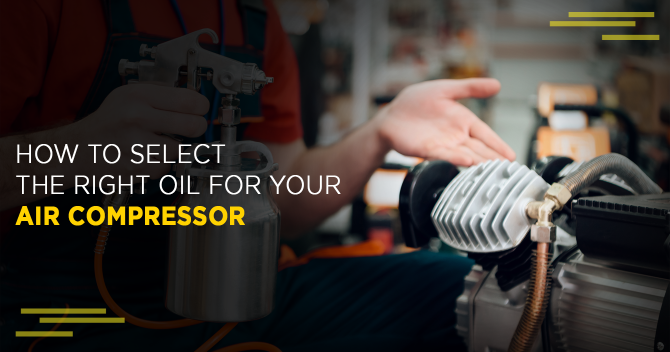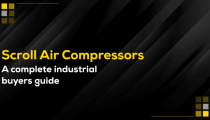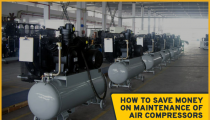Some years back, scroll air compressors were usually seen in…

How To Select The Right Oil For Your Air Compressor
Air compressors are complex machines demanding regular maintenance. A sort of high-viscosity varnish from lubricants tends to spread and plate out all over the rotors, bearings, shafts, and housings of compressors, making way for serious downtimes and demanding even part replacement if not checked in time. The upkeep of compressor devices therefore, besides timely oiling, also requires thorough cleaning of inner parts, ensuring the complete removal of accumulated sludge.
While regular lubrication can be credited with a number of excellent benefits for the machine, choosing the right oil for industrial-use, heavy-duty air compressors could be a slippery affair. Every year, industries using pneumatic machines report fires and explosions traced to carbon deposits from improper lubricating oils containing an excess of coke. Air compressor oils with low-carbon, or possibly carbon-neutral synthetic oils, are ideal for use in industrial spaces. Not only does this introduce a virtually carbon-free, a more eco-friendly system, but also confirms a more secure environment with an extra margin of operating safety.
Here are some great tips to choose the right kind of lubricating oils for heavy equipment:
Compatibility with Machine
Compatibility check for oiling of air compressors for different industrial use is essential to extend smooth running of machines. Industrial oils are typically meant to grease machine rotors. An auxiliary use is to cool and seal the compression chamber. For general purpose machining, the safest option is to go for a soluble air compressor oil with a composition of high lubricity of 50 percent oil pre-dilution. Using soluble oils can extend the tool life of a machine and also optimize rotoral cooling.
Mineral oils and synthetic oils too qualify for multi-purpose applications on pistons and screws of compressor machines. Since synthetic oil counterparts are consumed at a lower rate, it can be chosen over standard compressor lubricants for reduced exhaustion in machines that run daily for a lengthier spell.
Keep Reading: Maintenance Tips Ways To Extend The Life Of Your Air Compressor
Friction Wear Propensity
Lubrication with the right kind of oil is greatly effective for lengthening the equipment life of a compressor’s moving parts. An even consistency and flow, as well as high oil stability, can work wonders in decreasing friction-induced wear, while high-lubricity oils do not necessarily serve best for reducing the negative effects of friction.
One of the most commonly chosen air compressor lubricants is Synthetic hydrocarbons (POAs). Processed from ethylene, POAs show consistent flow across a wide range of temperatures and helps keep compressor parts not just lubricated but also clean.
Varying Temperature Effects
The effects of heat on the kinematic viscosity of different lubricant oils vary according to their susceptibility to thermal breakdown and oxidation. When exposed to the high heat of air compressors, some lubricant oils tend to release dollops of varnishes on the inside plating of a compressor machine.
While mineral oils have a higher tendency to accumulate varnishes, food-grade air compressor oils used where edibles come in direct contact with compressed air, are not likely to develop toxic residues when exposed to heat.
Keep Reading: Expert Tips to Increase Air Compressor Efficiency
Oil Flashpoint
It is extremely important to mark the specific burning points of compressor oils and measure their propensity to heat up when used for lubrication in an industrial function. Also important is to take into account oxidation processes of different oils and their rate of decomposition under gas-dynamic conditions and accordingly regulate oiling.
Well-calculated use as per a lubricant’s ignition temperature can drastically reduce the risks of spontaneous flare-ups upon reaching ignition temperature. Also notable is the fact that oils with a significantly high carbon depository capacity do not ignite very fast in a condition where compressed air transits through high-pressure valves into an oil-water separator where the lubricant is cleaned of moisture impurities. There are many other compressor lubricating oils with less carbon depositions that tend to burn up faster.
Rate of Evaporative Loss
Air compressors require sufficient oil for a smooth run to achieve the design efficiency of the machine in which the compressor is being used. But the use-up rate of every compressor oil is not the same. One of the biggest reasons for compressor early death is the fast evaporation of blended synthetic oils, causing lapse in timely refills that result in obstructive deposits in machine parts from evaporative residues of oil.
It is worth noting that mineral oils show a higher evaporation loss than semi and full-synthetic lubricants. You need to top up oil levels more frequently when using the mineral variety while synthetic oil top-ups could be fewer and further between. Also, semi-synthetic and synthetics do not leave behind as much residual deposits on machine parts as some other types of air compressor lubricating oils.




